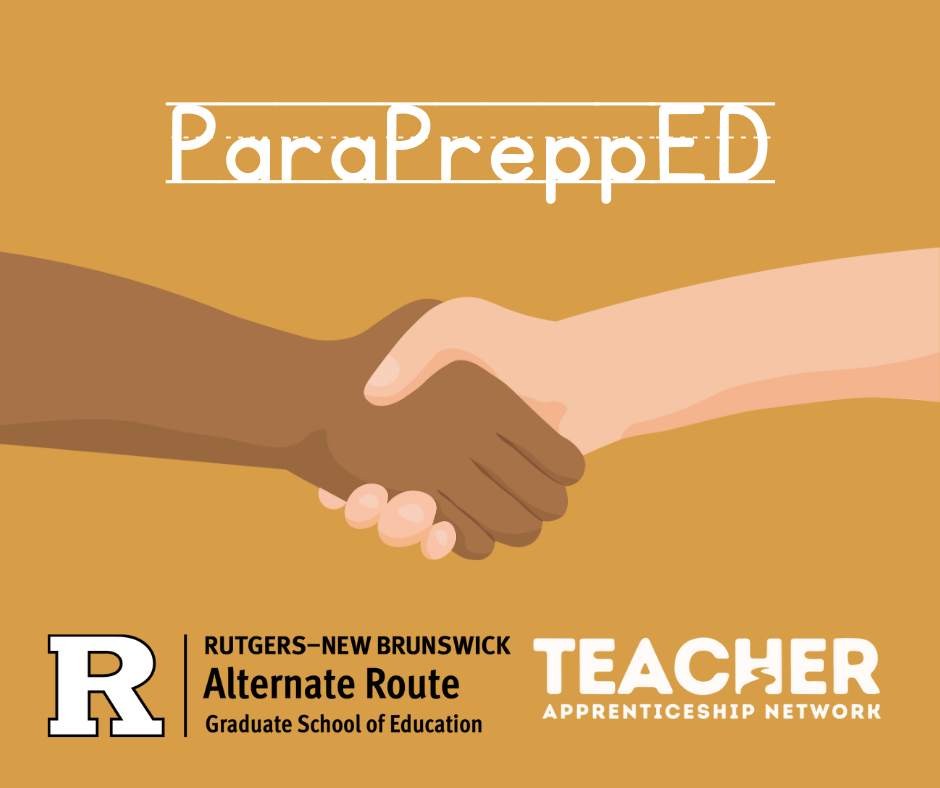Teacher Apprenticeship Programs Are Growing: Here’s How They Work

Rutgers Alternate Route candidates know there is more than one way to become certified full-time teachers. New Jersey substitute teachers and paraprofessionals are about to learn another—one that is specifically tailored to them.
In 2021, teacher apprenticeship programs began forming to address the growing teacher shortage. Data from the Learning Policy Institute discovered that roughly 406,964 provisionally licensed teachers still need to be fully certified, prompting action from state and federal governments.
The U.S. Department of Labor describes teacher apprenticeships as an effective “earn and learn” model that offers paid, on-the-job learning experiences as a path to certification. These highly customizable programs are tailored to individuals already working in districts. The model proved so successful that by May 2024, President Joe Biden’s administration expanded registered Teacher Apprenticeship programs to 34 states, the District of Columbia and Puerto Rico. In November, that number grew to 46.
New Jersey is one of those states, thanks to the New Jersey Department of Education (NJDOE), which awarded $800,000 in grants for teacher apprenticeship programs. Rutgers University and Ramapo College were the recipients, each awarded $400,000 to launch their programs.
“The Teacher Apprenticeship Program will be a game changer, helping to break down barriers to entry for paraprofessionals and classroom aides who want to become certified teachers and have already proven their passion for teaching the next generation,” New Jersey Governor Phil Murphy said in a statement.
How teacher apprenticeship programs work
Teacher apprenticeship programs are effective because they leverage the talent school districts already have, giving districts the power to shape their workforce.
Substitute teachers and paraprofessionals typically come with education, experience or a combination of the two. For example, the average paraprofessional has logged 12 years in classrooms and 75 percent have at least an associate’s degree. Likewise, substitute teachers are required to have a certain number of college credits completed, laying the foundational ground to become a certified teacher.
Teacher apprenticeship programs take advantage of that foundation and use it to provide opportunities for districts and their staff. Instead of attending instruction in a classroom setting, clinical training is conducted through a mentor teacher trained through the program. This mentor provides support, teaches on-the-job skills and responsibilities and measures the apprentice’s progress.
“It’s vital that we support the paraprofessionals and classroom aides in our educational system. Many of these professionals have worked tirelessly in classrooms for years and aspire to earn their teacher certification – but they face obstacles such as the cost of tuition and availability of programming,” Acting Commissioner of Education Kevin Dehmer said in a statement.
Teacher apprenticeship programs benefit substitute teachers and paraprofessionals because financial and time constraints are lowered, with most teacher apprenticeship programs being free for participants and they learn while on the job.
ParaPreppED supports aspiring New Jersey teachers

ParaPreppED is Rutgers University’s teacher apprenticeship program, operating through the Rutgers Graduate School of Education with support from the Teacher Apprenticeship Network. The NJDOE grant supports a partnership with geographically and enrollment-diverse districts that share the same goal: To encourage more instructional support staff to become full-time licensed K-12 teachers.
“This apprenticeship program will help clear the hurdles they face so they can achieve their goal of becoming a licensed New Jersey teacher, while also helping to meet the need for teachers in our school districts,” Dehmer said.
The ParaPreppED program aims to:
- Increase the number of Registered Teacher Apprenticeships in the state;
- Expand the teacher pipeline, leveraging the existing district talent;
- Address barriers for aspiring teachers through targeted support like Praxis prep; and
- Conduct and disseminate ongoing research on the implementation and impact of the initiative.
Noting the significant impact the teacher shortage has made on critical subjects like math, science, special education, ESL and Bilingual Education, the program’s design works to target these areas. Participants in this program are chosen based on their interests and alignment with each district’s apprenticeship program’s selection criteria.
If you’re considering following your dream of teaching, Rutgers Alternate Route can offer you the support and training you need to succeed. Be sure to follow Rutgers Alternate Route on Twitter and sign up for Alternate Route’s monthly newsletter for more information and stories from the field of education.

 Kwame Floyd is the founder and Executive Director of the Teacher Apprenticeship NetworkPreviously, Kwame served as the Strategic Operations Officer at the New Jersey Department of Education, where he played a pivotal role in advancing initiatives to strengthen teacher diversity through his work with the Diverse Teacher-Ready Initiative statewide working group. He also contributed as an advisor to My Brother’s Keeper at the Obama Foundation, further underscoring his commitment to equity in education.
Kwame Floyd is the founder and Executive Director of the Teacher Apprenticeship NetworkPreviously, Kwame served as the Strategic Operations Officer at the New Jersey Department of Education, where he played a pivotal role in advancing initiatives to strengthen teacher diversity through his work with the Diverse Teacher-Ready Initiative statewide working group. He also contributed as an advisor to My Brother’s Keeper at the Obama Foundation, further underscoring his commitment to equity in education.





